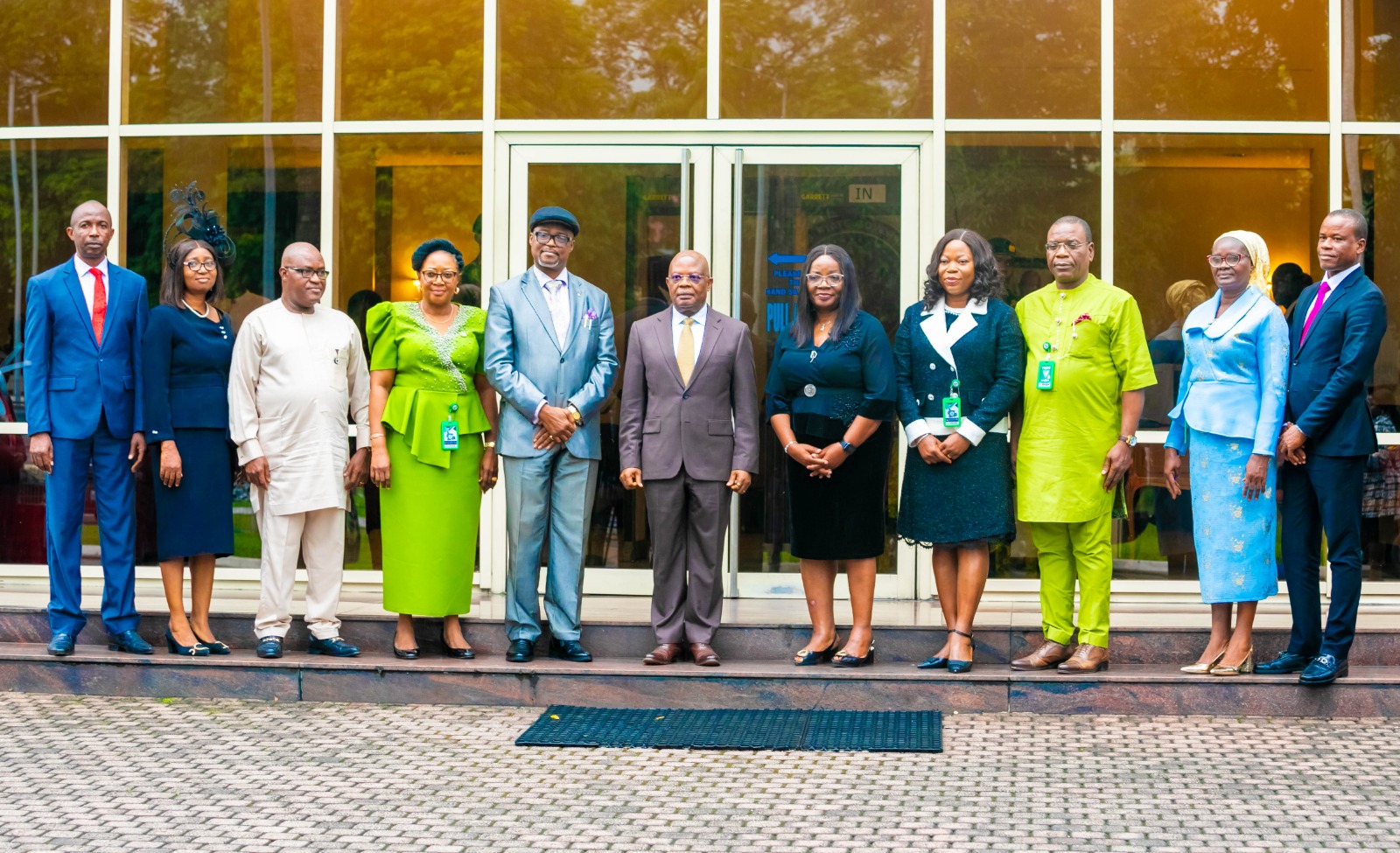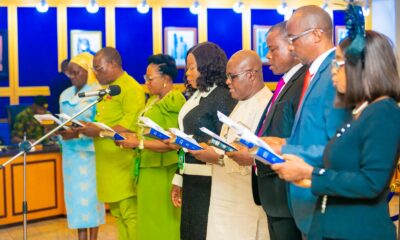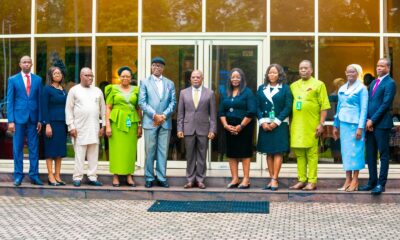Featured
Wike Hails Buhari’s Proactive Efforts At Defeating Terrorists …Donates N100m To Empower Veteran Servicemen As President, Vice Lay Final Wreaths In Office

Rivers State Governor, Chief Nyesom Wike, has commended President Muhammadu Buhari, for his sustained efforts at defeating the Boko Haram insurgents and bandits terrorising and destroying parts of the country.
This is even as President Muhammadu Buhari, yesterday, led other senior members of the government, including Vice President Yemi Osinbajo, to participate in their final Wreath Laying in office that marked the climax of the Armed Forces Remembrance Day Celebration.
Wike made this commendation at the Government House, Port Harcourt, after the wreath laying ceremony to mark the 2023 Armed Forces Remembrance Day celebration at the Isaac Boro Park, yesterday.
The governor noted that after the civil war broke out a few years after independence, the armed forces were forced to quell the ensuing rebellion, which ended after three gruesome years of internecine warfare.
He added that ever since then, there was hardly a year when members of the armed forces have not been assigned to one bloody combat mission or the other either within or outside the country.
The armed forces, he said, have also been at war with Boko Haram and other armed insurgents in the North-West and North-East of the country for over 10 years, and the “unknown gunmen” in the South-East of the country.
“I commend our President, Muhammadu Buhari, for his sustained efforts at defeating the Boko Haram insurgents and bandits terrorising and destroying our communities in parts of our country. The restoration of peace to our troubled geo-political regions, and the conduct of free and fair general election are the best legacies you can live for our country.
“As leaders, our goal must be one Nigeria, one destiny, and the challenges of building a more fair, inclusive and just society are not beyond us. Therefore, I will not relent in my prayers to God to enable Mr President and other leaders of our country to succeed in our mission and commitments to our country.”
Wike asserted that a grateful country honours her armed forces’ extraordinary bravery and courage during their service and the sacrifices of their families for the common good.
According to him, many members of the armed forces had paid the maximum price or been maimed while fighting in the numerous battles to achieve tactical victories over the enemies of the country and world peace.
“We respect them for the dangerous professional path they willingly chose, and love them as our children, relations, friends and members of our communities in the nation’s service.
“But they loved us more and even more significantly as fellow Nigerians by risking their lives, health, family and future on the battlefields to defend and protect us from harm’s way in return for almost nothing.
“We owe them a great deal as a nation. We owe them as states. We owe them as a people. Collectively, we owe them a debt we cannot repay.
“The much we can do on this day is to extoll their virtues, commemorate their sacrifice, and honour their heroic exploits so that they would never be forgotten for putting their lives on the line for us and others to live.”
The governor maintained that the country must move beyond today’s courtesies, speeches and parades to consider the families, including the innocent women and children directly devastated and thrown into untold hardship by the death or incapacitation of their breadwinners at the battlefield.
This, he said, calls for prioritising the welfare and well-being of the armed forces in and out of service, and their families with a concrete social security package, including prompt payment of terminal benefits and some form of economic security for the widows and their under-aged children.
He recommended that those suffering from various health challenges, including post-traumatic stress disorders, should have the best healthcare and attention from the public purse.
“As a state government, we have, over the years, provided financial support to our veterans through the state Office of the Nigerian Legion. We have since redeemed the N50million pledge we made during the remembrance emblem appeal fund launch in December, 2022.
“Today, I wish to donate the sum of N100million on behalf of the state government for the economic empowerment of the veteran servicemen from Rivers State.”
The governor appealed to well-meaning public and private individuals and organisations to contribute to improving the social and economic well-being of the legionnaires, and the wives and children of the fallen ex-servicemen.
In his remarks, Rivers State Chairman of Nigerian Legion, ACG Justice O. Chichi, commended Wike for the extraordinary kindness, which the Rivers State Government has always shown towards the welfare and support of veterans and the families of fallen heroes.
“My colleagues, widows and dependents of our fallen heroes, particularly the beneficiaries of your scholarship, have asked me to raise my voice and tell you a very big thank you, for the leader in you. We will forever be grateful to Your Excellency.”
Similarly, President Muhammadu Buhari, yesterday, led other senior members of the government, including Vice President Yemi Osinbajo, to participate in the final Wreath Laying Ceremony in office to mark the climax of the Armed Forces Remembrance Day celebration.
The President, who arrived at the National Arcade, Abuja, at 10:05 am, was immediately ushered onto the saluting dais for the National Salute.
Buhari, who inspected the Guards of Honour, accompanied by the Commander, Brigade of Guards, Major General Muhammad Takuti Usman, later proceeded to the Cenotaph for the Wreath Laying Ceremony.
After the President, other dignitaries that laid wreaths were Vice President Yemi Osinbajo; the President of the Senate, Dr Ahmad Lawan; the Speaker of the House of Representatives, Hon Femi Gbajabiamila; and the Chief Justice of Nigeria, Justice Olukayode Ariwoola.
Others, who laid wreaths, included the Ministers of Defense, Major General Bashir Magashi (rtd); Federal Capital Territory (FCT) Minister, Mallam Muhammed Musa Bello; the Chief of Defense Staff, General Lucky Irabor; and other service chiefs,including the Inspector-General General of Police, Usman Alkali Baba.
The rest were representatives of members of the Diplomatic Corps; and the pair of the chairman of the Nigerian Legion and a widow of a fallen officer.
The President, who also performed the symbolic freeing of white doves out of cage during the event, had the 2023 wreath laying ceremony as his last as Commander-in-Chief.
Also in attendance were members of the Federal Executive Council, including the Secretary to the Government of the Federation, Boss Mustapha; the Chief of Staff to the President, Prof Ibrahim Gambari; the National Security Adviser (NSA), Major General Babagana Monguno (rtd); and permanent secretaries, amongst others.
Featured
Rivers A Strategic Hub for Nigeria’s Blue Economy -Ibas …Calls For Innovation-Driven Solutions

The Administrator of Rivers State, Vice Admiral (Rtd.) Ibok-Ete Ibas, has emphasized the need for innovation-driven strategies, strategic partnerships, and firm policy implementation to fully harness the vast potential of the blue economy.
Speaking during a courtesy visit by participants of Study Group 7 of the Executive Course 47 from the National Institute for Policy and Strategic Studies (NIPSS) at Government House, Port Harcourt, on Monday, Ibas highlighted the importance of diversifying Nigeria’s economy beyond oil by leveraging maritime resources to create jobs, enhance food security, strengthen climate resilience, and generate sustainable revenue.
The Administrator, according to a statement by his Senior Special Adviser on Media, Hector Igbikiowubo, noted that with coordinated efforts and innovative solutions, the blue economy could serve as a catalyst for inclusive growth, economic stability, and long-term environmental sustainability.
“It is estimated that a fully developed blue economy could generate over $296 million annually for Nigeria, spanning fisheries, shipping and logistics, marine tourism, offshore renewable energy, aquaculture, biotechnology, and coastal infrastructure,” he stated.
“We must transition from extractive practices to regenerative, inclusive, and innovation-driven solutions. This requires political cohesion, intergovernmental collaboration, robust infrastructure, and institutional capacity—all of which must be pursued with urgency and intentionality,” he added.
Ibas urged sub-national governments, particularly coastal states, to domesticate the national blue economy framework and develop tailored strategies that reflect their comparative advantages.
He stressed that such efforts must be guided by disciplined planning, regulation, and investment to maximize the sector’s potential.
Highlighting Rivers State’s pivotal role, the Administrator outlined its strategic advantages as follows:
•Nearly 30% of Nigeria’s total coastline (approximately 853km)
•Over 40% of Nigeria’s crude oil and gas output
•More than 33% of the country’s GDP and foreign exchange earnings
•416 of Nigeria’s 1,201 oil wells, many located in marine environments
•Two of Nigeria’s largest seaports, two oil refineries, and the Nigerian Liquefied Natural Gas (NLNG) terminal in Bonny Island—one of Africa’s most advanced gas facilities
Despite these opportunities, Ibas acknowledged challenges such as pollution, coastal erosion, illegal oil refining, unregulated fishing, inadequate infrastructure, and maritime insecurity.
He reaffirmed his administration’s commitment to institutional reforms, coastal zone management, and inter-agency collaboration to build a governance structure that supports a sustainable blue economy.
“Sustainability must be embedded in our development models from the outset, not as an afterthought. We are actively exploring partnerships in maritime education, aquaculture development, port modernization, and renewable ocean energy. We welcome knowledge-sharing engagements like this to refine our strategies and enhance implementation,” he said.
He urged the NIPSS delegation to ensure their findings translate into actionable recommendations that address the sector’s challenges.
Leader of the delegation, Vice Admiral A.A. Mustapha, explained that the visit aligns with their strategic institutional tour mandate on the 2025 theme: “Blue Economy and Sustainable Development in Nigeria: Issues, Challenges, and Opportunities.”
The group is engaging stakeholders to deepen understanding of policy efforts and institutional roles in advancing sustainable development through the blue economy.
Featured
INEC To Unveil New Party Registration Portal As Applications Hit 129

The Independent National Electoral Commission (INEC) has announced that it has now received a total of 129 applications from associations seeking registration as political parties.
The update was provided during the commission’s regular weekly meeting held in Abuja, yesterday.
According to a statement signed by the National Commissioner and Chairman of the Information and Voter Education Committee, Sam Olumekun, seven new applications were submitted within the past week, adding to the previous number.
“At its regular weekly meeting held today, Thursday 10th July 2025, the commission received a further update on additional requests from associations seeking registration as political parties.
“Since last week, seven more applications have been received, bringing the total number so far to 129. All the requests are being processed,” the commission stated.
The commission revealed the introduction of a new digital platform for political party registration. The platform is part of the Party Financial Reporting and Auditing System and aims to streamline the registration process.
Olumekun disclosed that final testing of the portal would be completed within the next week.
“INEC also plans to release comprehensive guidelines to help associations file their applications using the new system.
“Unlike the manual method used in previous registration, the Commission is introducing a political party registration portal, which is a module in our Party Financial Reporting and Auditing System.
“This will make the process faster and seamless. In the next week, the commission will conclude the final testing of the portal before deployment.
“Thereafter, the next step for associations that meet the requirements to proceed to the application stage will be announced. The commission will also issue guidelines to facilitate the filing of applications using the PFRAS,” the statement added.
In the meantime, the list of new associations that have submitted applications has been made available to the public on INEC’s website and other official platforms.
Featured
Tinubu Signs Four Tax Reform Bills Into Law …Says Nigeria Open For Business

President Bola Tinubu yesterday signed into law four tax reform bills aimed at transforming Nigeria’s fiscal and revenue framework.
The four bills include: the Nigeria Tax Bill, the Nigeria Tax Administration Bill, the Nigeria Revenue Service (Establishment) Bill, and the Joint Revenue Board (Establishment) Bill.
They were passed by the National Assembly after months of consultations with various interest groups and stakeholders.
The ceremony took place at the Presidential Villa, yesterday.
The ceremony was witnessed by the leadership of the National Assembly and some legislators, governors, ministers, and aides of the President.
The presidency had earlier stated that the laws would transform tax administration in the country, increase revenue generation, improve the business environment, and give a boost to domestic and foreign investments.
“When the new tax laws become operational, they are expected to significantly transform tax administration in the country, leading to increased revenue generation, improved business environment, and a boost in domestic and foreign investments,” Special Adviser to the President on Media, Bayo Onanuga said on Wednesday.
Before the signing of the four bills, President Tinubu had earlier yesterday, said the tax reform bills will reset Nigeria’s economic trajectory and simplify its complex fiscal landscape.
Announcing the development via his official X handle, yesterday, the President declared, “In a few hours, I will sign four landmark tax reform bills into law, ushering in a bold new era of economic governance in our country.”
Tinubu made a call to investors and citizens alike, saying, “Let the world know that Nigeria is open for business, and this time, everyone has a fair shot.”
He described the bills as not just technical adjustments but a direct intervention to ease burdens on struggling Nigerians.
“These reforms go beyond streamlining tax codes. They deliver the first major, pro-people tax cuts in a generation, targeted relief for low-income earners, small businesses, and families working hard to make ends meet,” Tinubu wrote.
According to the President, “They will unify our fragmented tax system, eliminate wasteful duplications, cut red tape, restore investor confidence, and entrench transparency and coordination at every level.”
He added that the long-standing burden of Nigeria’s tax structure had unfairly weighed down the vulnerable while enabling inefficiency.
The tax reforms, first introduced in October 2024, were part of Tinubu’s post-subsidy-removal recovery plan, aimed at expanding revenue without stifling productivity.
However, the bills faced turbulence at the National Assembly and amongst some state governors who rejected its passing in 2024.
At the NASS, the bills sparked heated debate, particularly around the revenue-sharing structure, which governors from the North opposed.
They warned that a shift toward derivation-based allocations, especially with VAT, could tilt fiscal balance in favour of southern states with stronger consumption bases.
After prolonged dialogue, the VAT rate remained at 7.5 per cent, and a new exemption was introduced to shield minimum wage earners from personal income tax.
By May 2025, the National Assembly passed the harmonised versions with broad support, driven in part by pressure from economic stakeholders and international observers who welcomed the clarity and efficiency the reforms promised.
In his tweet, Tinubu stressed that this is just the beginning of Nigeria’s tax evolution.
“We are laying the foundation for a tax regime that is fair, transparent, and fit for a modern, ambitious Nigeria.
“A tax regime that rewards enterprise, protects the vulnerable, and mobilises revenue without punishing productivity,” he stated.
He further acknowledged the contributions of the Presidential Fiscal Policy and Tax Reform Committee, the National Assembly, and Nigeria’s subnational governments.
The President added, “We are not just signing tax bills but rewriting the social contract.
“We are not there yet, but we are firmly on the road.”
-
Rivers1 day ago
Monarch Cautions Youths Against Illicit Drug Consumption
-
Opinion1 day ago
Why Reduce Cut-Off Mark for C.O.E ?
-

 News1 day ago
News1 day agoNIMASA Shuts Two Lagos Terminals Over Security Breach
-
Politics1 day ago
Alleged Money Laundering: Fayose Has No Case To Answer, Court Tells EFCC
-

 Politics22 hours ago
Politics22 hours agoAtiku Quits PDP, Says Decision Heartbreaking
-
Rivers1 day ago
CDS Urges Communities To Protect Pipelines
-
Politics1 day ago
Atiku’s Exit No Problem To PDP – Makinde
-

 News1 day ago
News1 day agoShettima, Atiku, Obi Attend Buhari’s Fidau Prayer In Daura









